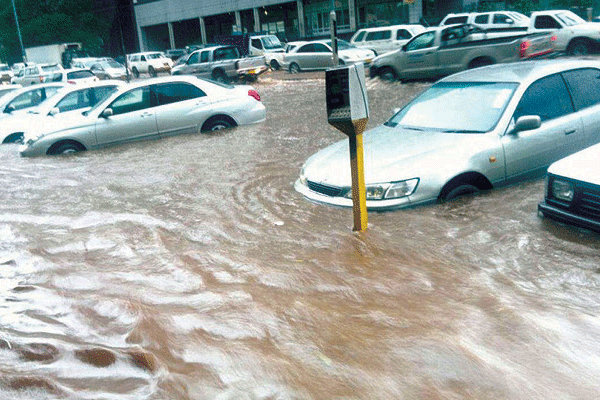
With the above normal rainfall that Zimbabwe is receiving, which in some instances is culminating in floods, the questions on many people’s minds are, “how much rainfall has the country so far received?”, “how much more rain can we expect?” and “when will the rainy season come to an end?”, among others.
environment By Chipo Masara

With Zimbabwe evidently being among those nations unfortunate enough to already be in the throngs of climate change, the catastrophic phenomenon has drastically changed weather patterns. It no longer rains during the times it used to and when it does, the rainfall patterns have become confusing, often characterised by long dry spells and often resulting in floods. On the other hand, the heat is more intense than it has ever been, with heat waves now a common occurrence.
In order for a country like Zimbabwe to survive climate change, it is important for people to be well-informed on the type of weather — which more often than not presents itself in extremity — to expect at each given time so as to know how best to prepare for it. For instance, it is very important for farmers to know when it will rain and just how much rain to expect so that they can plan their farming season appropriately. Without such crucial information, they are bound to be left counting their losses.
It is during times of such unpredictable weather conditions that a country’s meteorological department should prove its mettle.
Unfortunately for Zimbabwe, the country’s weather forecaster — Meteorological Services Department of Zimbabwe — appears overwhelmed and unable to effectively offer the services expected from it.
For one reason or another, the department has year after year failed to issue accurate forecasts, with a terrific example being over a week ago when they announced to the nation that “on Tuesday” people could expect the rains to stop, saying that would be followed by a dry period. The news came as relief to many — especially those with houses built on wetlands and have been battling with the rain — who felt a small break from the heavy rain and a little bit of sunshine was welcome. As it were, Tuesday brought even heavier rains, with no sunshine in sight. And so did Wednesday and Thursday. It was only towards the weekend that the rains eased off and there finally appeared a ray of sunshine.
The Standard Style contacted the Met Department on Tuesday via email, telephone, Facebook and WhatsApp with a list of questions, most of which sought to establish the amount of rain the country has so far received, and how much more can be expected. Despite acknowledging having received the questions and promising to respond, it turned out to be a wait in vain. The official that handles the department’s WhatsApp platform was later on at pains to justify the delay and explained how the different questions asked had to be answered by different departments, a process which would therefore take some time. There was also mention of not having had an internet connection for a number of days. At the end, no response to the questions came up until the time of going to print.
- Chamisa under fire over US$120K donation
- Mavhunga puts DeMbare into Chibuku quarterfinals
- Pension funds bet on Cabora Bassa oilfields
- Councils defy govt fire tender directive
Keep Reading
This was not the first time that efforts by The Standard Style to get some answers from the department had hit a snag.
One is left wondering if the men and women that the country has given the important task of weather forecasting even have formal meteorological training. One also wonders if the team even has common basic weather station instruments like rain gauges, anemometers and hygrometers to allow them to perform their duties. According to the country’s 2017 budget, the government allocated money towards the refurbishment of the Met Department. That must mean it hasn’t escaped the authorities that in its present state, the weather department is unable to effectively carry out its mandate.
With general consensus that Zimbabwe is already in the clutches of debilitating climate change, there is need to prepare for many hazards and disasters in the form of increased floods, landslides and mud slide damage, decreased water resource quantity and quality, increased heat stress, increased risk of damage to a number of crops, increased risk of forest fires, decreased crop yields etc., all of which can lead to displacement of people, deaths and serious illness — especially to the elderly and the poor.
In order for the country to be better prepared for the disasters that climate change will inevitably bring, having a reliable meteorological department that knows what it’s doing is of paramount importance. In the absence of such, the country can expect to continue being caught unaware.
The country needs a competent meteorological department that is able to give accurate information on current weather conditions, temperatures, wind speed, wind gust speed and direction, precipitation and amounts, humidity, visibility, UV Index, cloud cover, pressure, etc.
For feedback, email: [email protected]











